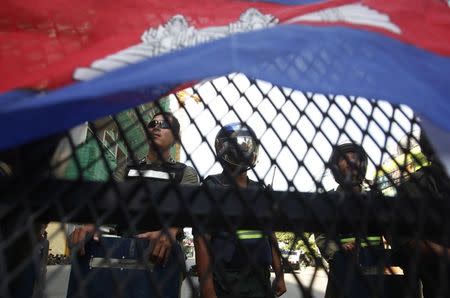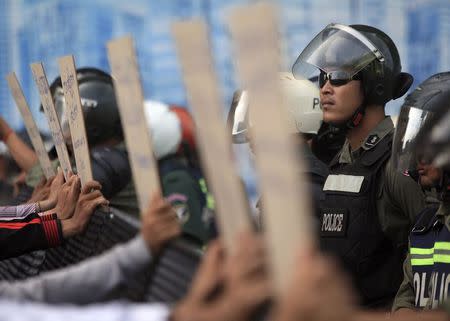Cambodia arrests more opposition members after violent clashes
By Prak Chan Thul PHNOM PENH (Reuters) - Cambodian police arrested two more opposition members of parliament on Thursday on charges of leading an insurrection, taking to eight the number of government opponents being held on accusations that rights groups say are politically motivated. The arrests are the latest twist in a year-long political crisis over a disputed election which has exposed a rift between long-serving authoritarian Prime Minister Hun Sen and many young, urban voters yearning for change. Six members of the opposition Cambodia National Rescue Party (CNRP), five of them members of parliament and one an activist, were ordered detained in prison pending trial on Wednesday on charges of leading an insurrection, which carries a penalty of up to 30 years in prison. Two more members of parliament for the party were picked up on Thursday. "Police surrounded their houses and they were arrested," CNRP lawmaker Yim Sovann told Reuters. The arrests came after violent clashes on Tuesday in which dozens of people were hurt after opposition lawmakers led a rally calling for the reopening of a Phnom Penh protest site. Freedom Park was the only place where protests were legally allowed until it was closed in January following demonstrations aimed at toppling Hun Sen, who has been in power since 1985. City security guards confronted the protesters as they tried to string up banners calling for the park to be reopened, sparking a melee. Some guards were attacked by protesters and at least 37 of them were injured, according to the government. The New York-based Human Rights Watch condemned the charges against the opposition supporters, saying they were trumped-up and that Cambodia's big aid donors should demand Hun Sen's government drop the cases and release those detained. "These charges against CNRP leaders call for a unified response from donors, who shouldn't play the game of saying they hope the legal process will be fair," the group's Asia director, Brad Adams, said in a statement. Surya Subedi, U.N. special rapporteur for human rights in Cambodia, called for an end to the ban on political gatherings. "Tolerance is crucial for the future of democracy," Subedi said in a statement. "I regret that a peaceful act of hanging a banner on the barbed wire should have led private security guards to take out batons to beat protesters, while the police looked on, which in turn led to acts akin to mob violence." Hun Sen, 61, has in recent years imposed political order and overseen economic growth after decades of conflict and turmoil that began when the country was sucked into the Vietnam War in the 1960s. But now the former Khmer Rouge guerrilla and self-styled "strongman" of politics is facing social-media-savvy younger voters hungry for change. Some analysts say Cambodia's population, 70 percent of whom were born after the 1970s and 1980s "Killing Fields" years, is no longer willing to put up with venal, authoritarian rule in the name of peace. (Editing by Amy Sawitta Lefevre and Robert Birsel)


